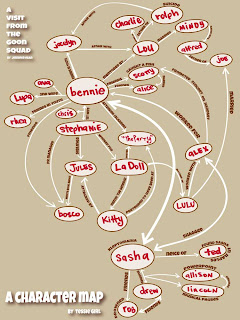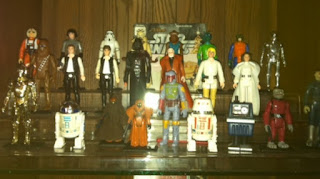Conversations With: Ekaterina Sedia
This week I have an interview with Ekaterina Sedia, a deep-dish writer if there ever was one. She is the author of the novel ACCORDING TO CROW, and her fiction appears in Analog, Aeon Magazine, Lenox Avenue and Poe's Progeny anthology. She's also the editor of the anthology JIGSAW NATION, in which a number of writers (including myself) imagine an America split in two.
Q: What compelled you to put together an anthology based on such a provocative topic as a 'divided America?'
A: I cannot take credit for that idea. It actually happened right after 2004 election, when the internet was rife with maps of "Jesusland" and "United States of Canada", and variations thereof. Talks of the secession were all over the place, and a few people at the SFReader.com forum started talking that the Blue State Secession was a good fictional premise. Ed McFadden volunteered to edit an anthology based on that premise, and I volunteered to help.
The reason I got involved was because as many others I was angry – not just at that election, but at the whole two party system, at the indifference of American people to suffering of people elsewhere, at those who don't pay attention and are so easily fooled by empty rhetoric, at those who believe that evolution is somehow 'controversial', at those who presume that they have a right to decide who is allowed get married… need I go on? Editing this anthology allowed me to do something constructive with this anger.
Q: Do you consider yourself a political writer? What's your take on the state of politics in fiction?
A: Yes, inasmuch as anyone who writes speculative fiction is. As far as I am concerned, you cannot write about the future and ignore the environmental disasters all around us, the Global Climate Change, rising ocean levels, horrible globalization that robs people of their livelihoods and dignity, modern-day slavery, the growing disparity between rich and poor nations. There isn't going to be a future to speak of unless the world is radically changed. On the other hand, when I write fantasy set in the past, current politics still informs the sorts of themes I'm interested in.
As for fiction (I will talk about speculative fiction) – there is much explicitly political fiction written today that is quite good; Nick Mamatas and Douglas Lain write excellent political fiction. There's also some that is mediocre. Like with any other fiction, if you have something interesting to say, the story will be interesting. If it's a rehash of slogans, it'll be boring.
Often, fantasy (especially heroic fantasy) is blamed for being apolitical or reactionary. Well, SF is guilty of that too – white men subduing alien planets and solving problems with state-of-the-art technology is still a staple today. I feel it is no less reactionary than fantasy about restoring the rightful heir to the throne – both are based on preservation of status quo, and resistance to change. Not that there are no good stories written in either of those milieus, but many are drivel – precisely because the authors do not examine the truthfulness of the underlying assumptions. The belief in humanity's ability to solve any problem with technology is still very persistent, despite the fact that many of the problems we face today are not solvable by technological means. It's just one example of societal belief system influencing writers, and no one is outside this system. You can either ignore your assumptions, or acknowledge them, or question them. In that sense, all fiction is political.
Q: You're both an editor and a writer of short stories; has seeing it from both sides given you any perspective on the trials of writing/selling short fiction you didn't have before?
A: Certainly. The process is inherently inhumane – in the sense that no editor sits down with a stack of stories, intending to give every single writer a chance. Editors look for stuff they would like to publish, and if it doesn't look like what they want on the first page, into reject pile it goes.
Many writers produce perfectly competent stories, which completely lack any distinctive characteristics – they've been polished to the point of removing anything that stands out, and end up like those pebbles you find by the sea, smooth and identical. I was in a writing workshop some time ago, and I noticed that there was a strong trend to remove any hint of individuality from writing, striving for bland prose. This extruded fiction product is something I avoid as an editor. As a writer, I started to pay more attention to voice – something that makes a story different. Having a point also helps.
Q: What question do you wish interviewers would ask you for crying out loud?
A: Uh… "Where can I buy your fiction?"
Many thanks to Kat for her time and answers!
Q: What compelled you to put together an anthology based on such a provocative topic as a 'divided America?'
A: I cannot take credit for that idea. It actually happened right after 2004 election, when the internet was rife with maps of "Jesusland" and "United States of Canada", and variations thereof. Talks of the secession were all over the place, and a few people at the SFReader.com forum started talking that the Blue State Secession was a good fictional premise. Ed McFadden volunteered to edit an anthology based on that premise, and I volunteered to help.
The reason I got involved was because as many others I was angry – not just at that election, but at the whole two party system, at the indifference of American people to suffering of people elsewhere, at those who don't pay attention and are so easily fooled by empty rhetoric, at those who believe that evolution is somehow 'controversial', at those who presume that they have a right to decide who is allowed get married… need I go on? Editing this anthology allowed me to do something constructive with this anger.
Q: Do you consider yourself a political writer? What's your take on the state of politics in fiction?
A: Yes, inasmuch as anyone who writes speculative fiction is. As far as I am concerned, you cannot write about the future and ignore the environmental disasters all around us, the Global Climate Change, rising ocean levels, horrible globalization that robs people of their livelihoods and dignity, modern-day slavery, the growing disparity between rich and poor nations. There isn't going to be a future to speak of unless the world is radically changed. On the other hand, when I write fantasy set in the past, current politics still informs the sorts of themes I'm interested in.
As for fiction (I will talk about speculative fiction) – there is much explicitly political fiction written today that is quite good; Nick Mamatas and Douglas Lain write excellent political fiction. There's also some that is mediocre. Like with any other fiction, if you have something interesting to say, the story will be interesting. If it's a rehash of slogans, it'll be boring.
Often, fantasy (especially heroic fantasy) is blamed for being apolitical or reactionary. Well, SF is guilty of that too – white men subduing alien planets and solving problems with state-of-the-art technology is still a staple today. I feel it is no less reactionary than fantasy about restoring the rightful heir to the throne – both are based on preservation of status quo, and resistance to change. Not that there are no good stories written in either of those milieus, but many are drivel – precisely because the authors do not examine the truthfulness of the underlying assumptions. The belief in humanity's ability to solve any problem with technology is still very persistent, despite the fact that many of the problems we face today are not solvable by technological means. It's just one example of societal belief system influencing writers, and no one is outside this system. You can either ignore your assumptions, or acknowledge them, or question them. In that sense, all fiction is political.
Q: You're both an editor and a writer of short stories; has seeing it from both sides given you any perspective on the trials of writing/selling short fiction you didn't have before?
A: Certainly. The process is inherently inhumane – in the sense that no editor sits down with a stack of stories, intending to give every single writer a chance. Editors look for stuff they would like to publish, and if it doesn't look like what they want on the first page, into reject pile it goes.
Many writers produce perfectly competent stories, which completely lack any distinctive characteristics – they've been polished to the point of removing anything that stands out, and end up like those pebbles you find by the sea, smooth and identical. I was in a writing workshop some time ago, and I noticed that there was a strong trend to remove any hint of individuality from writing, striving for bland prose. This extruded fiction product is something I avoid as an editor. As a writer, I started to pay more attention to voice – something that makes a story different. Having a point also helps.
Q: What question do you wish interviewers would ask you for crying out loud?
A: Uh… "Where can I buy your fiction?"
Many thanks to Kat for her time and answers!


Comments